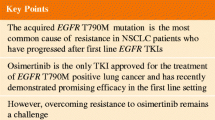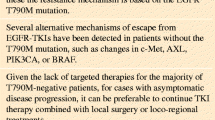Summary
The molecular characterisation of nonsquamous lung cancer has now become a standard procedure. In addition to the rare EML4-ALK and ROS-1 mutations, the detection of an epidermal growth factor receptor (EGFR) mutation has become a crucial factor in the selection of an optimal targeted therapy. Deletion of exon 19 and the L858R point mutation account for approximately 90 % of activating EGFR mutations and patients with these mutations are highly sensitive to treatment with EGFR tyrosine kinase inhibitors (EGFR TKIs). First-generation EGFR TKIs (gefitinib, erlotinib) reversibly inhibit the EGFR tyrosine kinase, while second-generation EGFR TKIs (afatinib, dacomitinib) are irreversible EGFR TKIs. However, despite an often excellent initial response to treatment with first- or second-generation EGFR TKIs, patients eventually develop drug resistance after approximately 9–12 months of treatment. T790M-targeting third-generation EGFR TKIs as osimertinib and rociletinib have shown high response rates of about 60 % in EGFR T790M-positive pretreated patients with a favourable toxicity profile. Unfortunately, patients eventually developed resistance to these drugs after approximately 10 months and the third-generation EGF R Cys797S mutation was recently reported to be a potential mechanism of resistance to third-EGFR TKIs.


Similar content being viewed by others
References
Scagliotti G, Parikh P, von Pawel J, Biesma B, Vansteenkiste J, et al. Phase III study comparing cisplatin plus gemcitabine with cisplatin plus pemetrexed in chemotherapy-naive patients with advanced-stage non-small-cell lung cancer. J Clin Oncol. 2008;26(21):3543–51.
Sandler A, Yi J, Dahlberg S, Kolb MM, Wang L, Hambleton J, Schiller J, et al. Treatment outcomes by tumor histology in Eastern Cooperative Group Study E4599 of bevacizumab with paclitaxel/carboplatin for advanced non-small cell lung cancer. J Thorac Oncol. 2010;5(9):1416–23.
Han S, Kim T, Hwang P, Jeong S, Kim J, Choi I, et al. Predictive and prognostic impact of epidermal growth factor receptor mutation in non-small-cell lung cancer patients treated with gefitinib. J Clin Oncol. 2005;23(11):2493–501.
Warth A, Endris V, Penzel R, Weichert W. Molekularpathologie des Lungenkarzinoms „State of the art“ 2014. Pathologe. 2014;35(6):565–73.
Warth A, Endris V, Kriegsmann M, Stenzinger A, Penzel R, Pfarr N, Weichert W. Molekulardiagnostik des nichtkleinzelligen Lungenkarzinoms. Neue Marker und Technologien. Pathologe. 2015;36(2):154–63.
Castellanos E, Horn L. Generations of epidermal growth factor receptor Tyrosine Kinase inhibitors: perils and progress. Curr Treat Options Oncol. 2015;16:51.
Wang S, Cang S, Liu D. Third-generation inhibitors targeting EGFR T790M mutation in advanced non-small cell lung cancer. J Hematol Oncol. 2016;9:34.
Levy B, Rao P, Becker D, Becker K. Attacking a moving target: understanding resistance and managing progression in EGFR-positive lung cancer patients treated with Tyrosine Kinase inhibitors. Oncology. 2016;30(7):601–12.
Huang L, Fu L. Mechanisms of resistance to EGFR tyrosine kinase inhibitors. Acta Pharm Sin B. 2015;5(5):390–401.
Lo P, Dahlberg S, Nishino M, Johnson B, Sequist L, Jackman D, et al. Delay of treatment change after objective progression on first-line erlotinib in epidermal growth factor receptor-mutant lung cancer. Cancer. 2015;121(15):2570–7.
Weickhardt A, Scheier B, Burke J, Gan G, Lu X, Bunn P, et al. Local ablative therapy of oligoprogressive disease prolongs disease control by tyrosine kinase inhibitors in oncogene-addicted non-small-cell lung cancer. J Thorac Oncol. 2012;7(12):1807–14.
Yu H, Sima C, Huang J, Solomon S, Rimner A, Paik P, et al. Local therapy with continued EGFR tyrosine kinase inhibitor therapy as a treatment strategy in EGFR-mutant advanced lung cancers that have developed acquired resistance to EGFR tyrosine kinase inhibitors. J Thorac Oncol. 2013;8(3):346–51.
Auliac J, Fournier C, Audigier V, Perol M, Bizieux A, Vinas F, et al. Impact of continuing first-line EGFR Tyrosine Kinase inhibitor therapy beyond RECIST disease progression in patients with advanced EGFR-mutated non-small-cell lung cancer (NSCLC): retrospective GFPC 04-13 study. Target Oncol. 2016;11(2):167–74.
Goldberg S, Oxnard G, Digumarthy S, Muzikansky A, Jackman D, Lennes I, Sequist V. Chemotherapy with Erlotinib or chemotherapy alone in advanced non-small cell lung cancer with acquired resistance to EGFR tyrosine kinase inhibitors. Oncologist. 2013;18(11):1214–20.
Soria J, Wu Y, Nakagawa K, Kim S, Yang J, Ahn M, et al. Gefitinib plus chemotherapy versus placebo plus chemotherapy in EGFR-mutation-positive non-small-cell lung cancer after progression on first-line gefitinib (IMPRESS): a phase 3 randomised trial. Lancet Oncol. 2015;16(8):990–8.
Scagliotti G, von Pawel J, Novello S, Ramlau R, Favaretto A, Barlesi F, et al. Phase III multinational, randomized, double-blind, placebo-controlled study of Tivantinib (ARQ 197) plus Erlotinib versus Erlotinib alone in previously treated patients with locally advanced or metastatic nonsquamous non-small-cell lung cancer. J Clin Oncol. 2015;33(24):2667–74.
Borghaei H, Paz-Ares L, Horn L, Spigel D, Steins M, Ready N, et al. Nivolumab versus Docetaxel in advanced nonsquamous non-small-cell lung cancer. N Engl J Med. 2015;373(17):1627–39.
Masago K, Fujita S, Muraki M, Hata A, Okuda C, Otsuka K, et al. Next-generation sequencing of tyrosine kinase inhibitor-resistant non-small-cell lung cancers in patients harboring epidermal growth factor-activating mutations. BMC Cancer. 2015;15:908.
Jänne P, Yang J, Kim D, Planchard D, Ohe Y, Ramalingam S, et al. AZD9291 in EGFR inhibitor-resistant non-small-cell lung cancer. N Engl J Med. 2015;372(18):1689–99.
Sequist L, Soria J, Goldman J, Wakelee H, Gadgeel S, Varga A, et al. Rociletinib in EGFR-mutated non-small-cell lung cancer. N Engl J Med. 2015;372(18):1700–9.
Costa D, Kobayashi S. Whacking a mole-cule: clinical activity and mechanisms of resistance to third generation EGFR inhibitors in EGFR mutated lung cancers with EGFR-T790M. Transl Lung Cancer Res. 2015;4(6):809–15.
Greenhalgh J, Dwan K, Boland A, Bates V, Vecchio F, et al. First-line treatment of advanced epidermal growth factor receptor (EGFR) mutation positive non-squamous non-small cell lung cancer. Cochrane Database Syst Rev. 2016. doi:10.1002/14651858.cd010383.pub2.
Author information
Authors and Affiliations
Corresponding author
Ethics declarations
Conflict of interest
A. Zabernigg declares that he has no competing interests.
Rights and permissions
About this article
Cite this article
Zabernigg, A. Therapy for EGFR tyrosine kinase inhibitor-resistant NSCLC with a focus on the T790M-resistant mutation. memo 9, 187–190 (2016). https://doi.org/10.1007/s12254-016-0288-y
Received:
Accepted:
Published:
Issue Date:
DOI: https://doi.org/10.1007/s12254-016-0288-y




